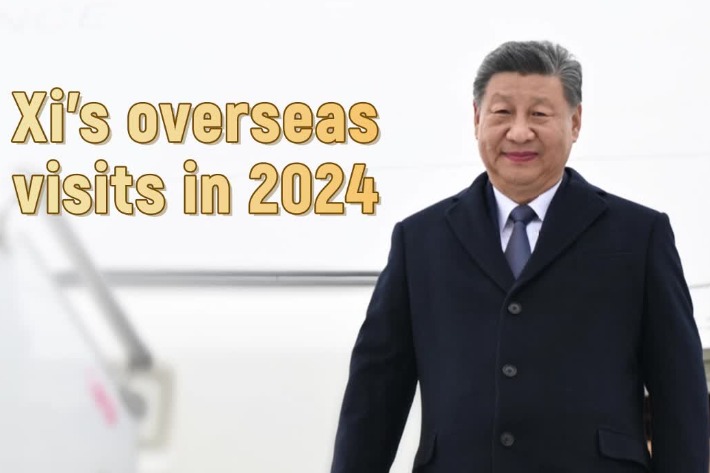Things are looking up
Led by the meteoric rise of China, the emergence of the Global South on the world stage is driving the rebalancing of power that has historically favored the West


Editor's note: The world has undergone many changes and shocks in recent years. Enhanced dialogue between scholars from China and overseas is needed to build mutual understanding on many problems the world faces. For this purpose, the China Watch Institute of China Daily and the National Institute for Global Strategy, Chinese Academy of Social Sciences, jointly present this special column: The Global Strategic Dialogue, in which experts from China and abroad will offer insightful views, analysis and fresh perspectives on long-term strategic issues of global importance.
The global governance landscape is undergoing a transformation, driven increasingly by the growing influence of the Global South. Dominated by Western powers, the existing system of international institutions, norms and procedures that facilitate cooperation on global issues such as economic development, trade, human rights, peace and security, and environmental protection is now witnessing a rebalancing.
At the heart of this shift is China, whose strategic partnerships and initiatives are reshaping the role of the Global South in institutions such as the United Nations, the UN Security Council and the G20, and promoting the emergence of new blocs such as BRICS.
The ascent of the Global South in global governance reflects a more equitable world order that accounts for the aspirations and priorities of developing nations. Within this transformation, China's leadership stands out as pivotal. Through its Belt and Road Initiative, China has fostered infrastructural connectivity and economic integration across Asia, Africa and Latin America. This initiative has not only stimulated economic growth in the Global South but also redefined global trade patterns, challenging the traditional dominance of Western-centric institutions.
One critical example of the Global South's influence is evident in the UN. Developing countries, often marginalized in decision-making processes, are now asserting their voices through coalitions such as the G77+China. This bloc, which now represents over 130 developing nations, has pushed for reforms in multilateral institutions to ensure that they reflect the needs and concerns of the Global South. China's support for these calls has been instrumental, given its permanent seat on the UNSC and its ability to champion equitable representation and fair decision-making.
In the UNSC, where the balance of power historically favored the West, China has emerged as a staunch advocate for Africa, Asia and Latin America. Whether by backing African-led initiatives for conflict resolution or advocating for the principle of non-interference in the internal affairs of sovereign nations, Beijing's positions often align with the broader interests of the Global South. This alignment underscores the importance of Sino-Africa cooperation in driving systemic change in global governance. African countries have increasingly relied on China's support to amplify their voices on issues ranging from peacekeeping to climate finance.
The G20, another crucial platform for global governance, highlights the growing impact of the Global South. Unlike the G7, the group includes prominent developing nations such as India, Brazil, South Africa and Indonesia. China's presence in the G20 is significant, not only because of its economic heft but also due to its ability to bridge the interests of developed and developing nations. For example, China's efforts to ensure that the G20 agenda addresses debt relief for low-income countries and climate finance are crucial to the Global South's sustainable development.
Perhaps the most striking example of the Global South's ascent is the emergence of BRICS as a counterweight to Western-dominated institutions such as the International Monetary Fund and the World Bank. Initially an economic grouping, BRICS has evolved into a platform for political and security cooperation, reflecting a shared vision for a multipolar world. China's role within BRICS is particularly notable; it has spearheaded initiatives such as the New Development Bank, which provides infrastructure and sustainable development financing without the conditionalities often associated with Western financial institutions.
BASE, a newer coalition grouping Brazil, Argentina, South Africa and Ethiopia, further demonstrates how the Global South is reshaping global governance. These nations have collectively emphasized the need for reform in international trade rules to eliminate barriers that disadvantage developing economies. China's backing for these initiatives, coupled with its increasing investments in BASE countries, underscores its commitment to fostering a more inclusive global economy.
Sino-Africa cooperation has become a cornerstone of the Global South's influence in global governance. The Forum on China-Africa Cooperation exemplifies this partnership, serving as a platform for dialogue and collaboration on development, trade and security. Through the FOCAC, African nations have secured significant investments in infrastructure, education and healthcare. Additionally, China's support for African Union initiatives, such as Agenda 2063, demonstrates its recognition of Africa's strategic importance in the global order.
Another striking example of the Global South's influence is the growing role of African countries in the UN's peacekeeping missions. Nations such as Rwanda, Ethiopia and Ghana have become leading contributors to UN peacekeeping forces, shaping global security discussions. China has consistently backed these efforts, providing logistical and financial support, while also deploying its own peacekeepers to regions such as South Sudan. This collaboration highlights the shared commitment of the Global South to fostering global peace and stability.
In addition, the establishment of the African Continental Free Trade Area has positioned Africa as a critical player in global trade negotiations. Supported by Chinese investments in regional infrastructure, the AfCFTA aims to create the largest free-trade area in the world, boosting intra-African trade and enhancing the continent's negotiating power in global trade forums. This development underscores how regional initiatives, backed by Sino-African partnerships, are enabling the Global South to reshape global economic governance.
Moreover, China's role in addressing global environmental challenges has further cemented its leadership in the Global South. The Paris Agreement on climate change showcased Beijing's ability to rally developing nations around ambitious climate goals. By prioritizing renewable energy projects and sustainable development in its engagements with the Global South, China has positioned itself as a key driver of the green transition, ensuring that the voices of developing countries are central to global climate governance.
However, the rise of the Global South in global governance is not without challenges. Critics often question the sustainability of China's financial assistance and the transparency of its projects. Addressing these concerns will be crucial for the long-term credibility and effectiveness of Sino-Africa cooperation and the broader Global South agenda. Additionally, fostering greater unity among developing nations will be essential to overcoming divisions that could weaken their collective bargaining power in multilateral institutions.
The Global South's growing influence in global governance signals a paradigm shift toward a more inclusive and equitable world order. Central to this transformation is China's leadership, which has empowered developing nations to assert their priorities and reshape global institutions. Through platforms such as BRICS and the FOCAC, and its strategic engagement with Africa and BASE, China has amplified the voice of the Global South on critical issues such as trade, development and climate change. As this trend continues, Sino-Africa cooperation will remain a driving force in creating a global governance system that genuinely reflects the diversity and aspirations of the world's nations.


The author is executive director of South-South Dialogues, a Nairobi-based communications development think tank. The author contributed this article to China Watch, a think tank powered by China Daily.
Contact the editor at editor@chinawatch.cn.


































